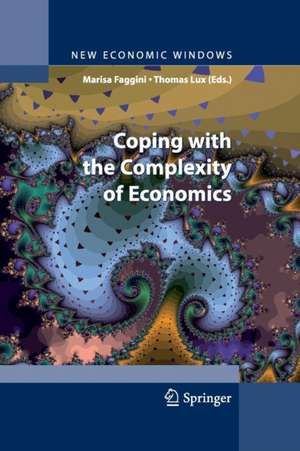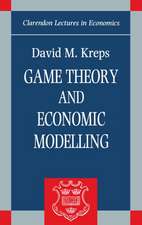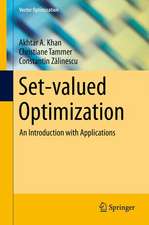Coping with the Complexity of Economics: New Economic Windows
Editat de Marisa Faggini, Thomas Luxen Limba Engleză Paperback – 23 noi 2014
| Toate formatele și edițiile | Preț | Express |
|---|---|---|
| Paperback (1) | 635.15 lei 43-57 zile | |
| Springer – 23 noi 2014 | 635.15 lei 43-57 zile | |
| Hardback (1) | 641.71 lei 43-57 zile | |
| Springer – 18 noi 2008 | 641.71 lei 43-57 zile |
Din seria New Economic Windows
-
 Preț: 363.47 lei
Preț: 363.47 lei - 18%
 Preț: 953.97 lei
Preț: 953.97 lei - 15%
 Preț: 647.08 lei
Preț: 647.08 lei -
 Preț: 398.74 lei
Preț: 398.74 lei -
 Preț: 386.81 lei
Preț: 386.81 lei - 18%
 Preț: 1395.63 lei
Preț: 1395.63 lei - 18%
 Preț: 791.09 lei
Preț: 791.09 lei - 18%
 Preț: 781.77 lei
Preț: 781.77 lei - 18%
 Preț: 951.29 lei
Preț: 951.29 lei -
 Preț: 379.09 lei
Preț: 379.09 lei - 15%
 Preț: 644.63 lei
Preț: 644.63 lei -
 Preț: 399.67 lei
Preț: 399.67 lei -
 Preț: 390.46 lei
Preț: 390.46 lei -
 Preț: 386.00 lei
Preț: 386.00 lei - 18%
 Preț: 941.82 lei
Preț: 941.82 lei -
 Preț: 389.70 lei
Preț: 389.70 lei - 18%
 Preț: 729.23 lei
Preț: 729.23 lei - 18%
 Preț: 951.91 lei
Preț: 951.91 lei - 18%
 Preț: 949.10 lei
Preț: 949.10 lei - 15%
 Preț: 643.00 lei
Preț: 643.00 lei - 15%
 Preț: 645.47 lei
Preț: 645.47 lei - 15%
 Preț: 585.40 lei
Preț: 585.40 lei - 15%
 Preț: 695.53 lei
Preț: 695.53 lei - 15%
 Preț: 636.63 lei
Preț: 636.63 lei - 18%
 Preț: 786.66 lei
Preț: 786.66 lei - 15%
 Preț: 634.18 lei
Preț: 634.18 lei - 18%
 Preț: 1112.15 lei
Preț: 1112.15 lei
Preț: 635.15 lei
Preț vechi: 747.23 lei
-15% Nou
Puncte Express: 953
Preț estimativ în valută:
121.57€ • 132.10$ • 102.19£
121.57€ • 132.10$ • 102.19£
Carte tipărită la comandă
Livrare economică 21 aprilie-05 mai
Preluare comenzi: 021 569.72.76
Specificații
ISBN-13: 9788847055698
ISBN-10: 8847055695
Pagini: 188
Ilustrații: XIV, 170 p.
Dimensiuni: 155 x 235 x 10 mm
Greutate: 0.27 kg
Ediția:2009
Editura: Springer
Colecția Springer
Seria New Economic Windows
Locul publicării:Milano, Italy
ISBN-10: 8847055695
Pagini: 188
Ilustrații: XIV, 170 p.
Dimensiuni: 155 x 235 x 10 mm
Greutate: 0.27 kg
Ediția:2009
Editura: Springer
Colecția Springer
Seria New Economic Windows
Locul publicării:Milano, Italy
Public țintă
Professional/practitionerCuprins
Evolution of Economic Systems.- Evolution of Trust in Economic Systems.- Keynes, Hayek and Complexity.- A look at the relationship between industrial dynamics and aggregate fluctuations.- Quantum Physics and Financial Markets.- Quantum-like Viewpoint on the Complexity and Randomness of the Financial Market.- Classical and Quantum-Like Randomness and the Financial Market.- New Empirical Approaches to Complex Economic Dynamics.- Examination of the Cost-of-Carry Formula for Futures Contracts on WIG20. Wavelet and Nonlinear Cointegration Analysis.- A Complex Approach to Estimate Shadow Economy: The Structural Equation Modelling.- Will house prices rise in 2007? A comparative assessment of house prices in London and Dublin.- Models of Risk Management and Decision Support.- Risk Measuremant and Fair Valuation Assessment in the Life Insurance Field.- Analysis of Qualitative and Quantitative Rankings in Multicriteria Decision Making.
Textul de pe ultima copertă
The purpose of the science of complexity is to provide, if not a unified approach, at least useful tools to tackling complex problems in various scientific domains. Generally, complexity is considered a fundamental challenge to the reductionist approach in science as a whole and to its ideas of certainty and randomness.
The overall behaviour of a complex system is different from and more than the sum of its parts. The behaviour of non-linear complex systems depends on the interaction (often with retroactive effects) among its constituent parts and not so much (or not only) on the characteristics of these parts themselves; the sum of the behaviour of single parts does not necessarily provide us with an explanation of the aggregate behaviour of a system.
All this is true for economic systems. These are based on the activities of single economic agents. Each individual can obtain only partial knowledge that is focussed around its "world" (local information) and react to external shocks in different ways (local rationality).
The aim of this book is to provide an overview to recent developments in theory and empirical research that view economic systems as complex phenomena whose aggregate dynamics can often not be inferred from its microscopic (microeconomic) building blocks. The collection of papers represented in this volume is dedicated to the memory of Massimo Salzano, who has been a fervent and eloquent advocate of the complexity approach.
The contributions have been presented at a conference held to celebrate Massimo’s 60th birthday (Ecople -Economics: From Tradition of Complexity, Capri, 2-4 June, 2006), one year before he unexpectedly passed away in 2007.
The overall behaviour of a complex system is different from and more than the sum of its parts. The behaviour of non-linear complex systems depends on the interaction (often with retroactive effects) among its constituent parts and not so much (or not only) on the characteristics of these parts themselves; the sum of the behaviour of single parts does not necessarily provide us with an explanation of the aggregate behaviour of a system.
All this is true for economic systems. These are based on the activities of single economic agents. Each individual can obtain only partial knowledge that is focussed around its "world" (local information) and react to external shocks in different ways (local rationality).
The aim of this book is to provide an overview to recent developments in theory and empirical research that view economic systems as complex phenomena whose aggregate dynamics can often not be inferred from its microscopic (microeconomic) building blocks. The collection of papers represented in this volume is dedicated to the memory of Massimo Salzano, who has been a fervent and eloquent advocate of the complexity approach.
The contributions have been presented at a conference held to celebrate Massimo’s 60th birthday (Ecople -Economics: From Tradition of Complexity, Capri, 2-4 June, 2006), one year before he unexpectedly passed away in 2007.


















